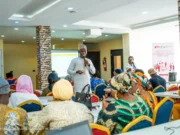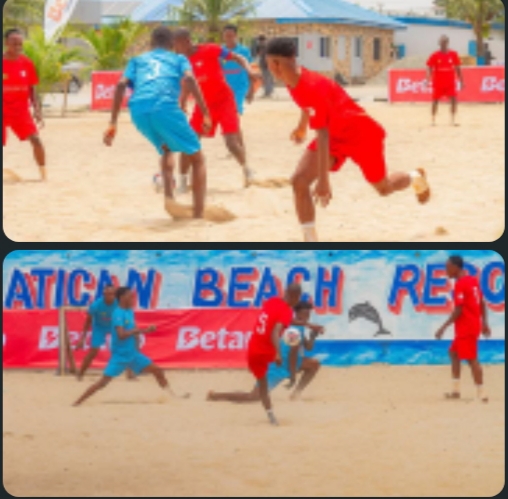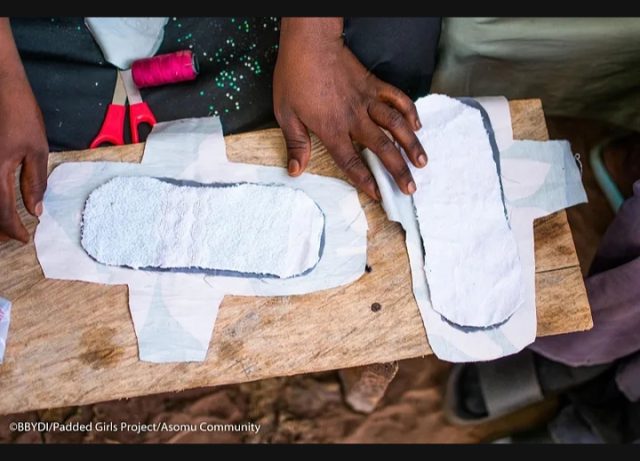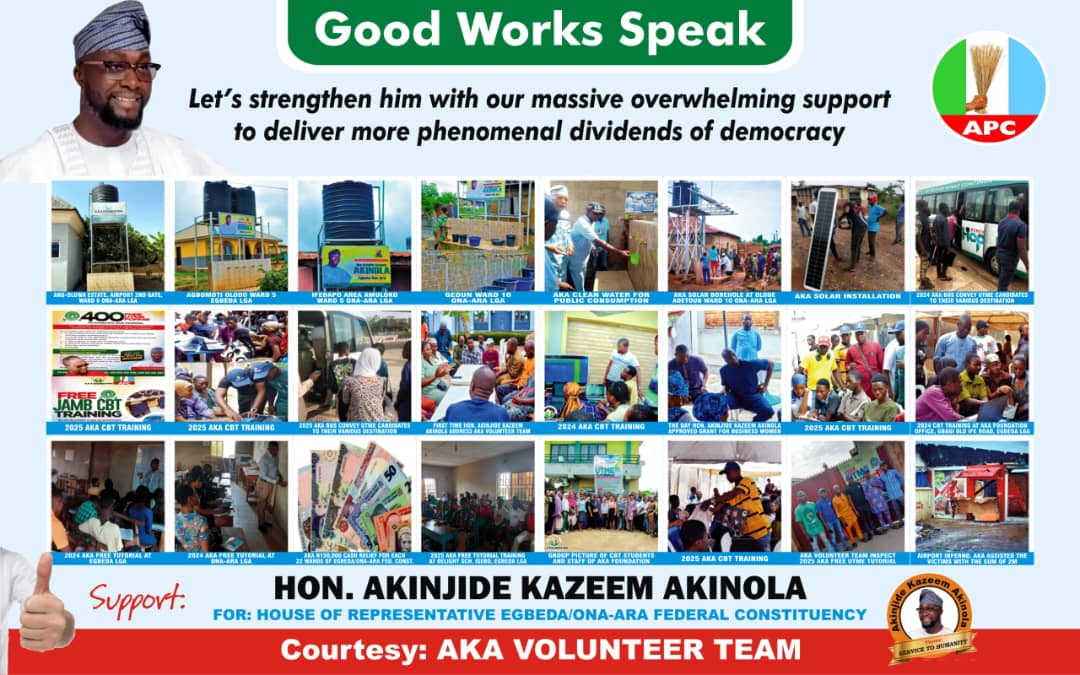HEALTH — Every month, in towns and villages across Nigeria, countless girls disappear from classrooms because they’re menstruating. Without access to sanitary pads or private toilets, many stay home. Others use rags, old newspapers, or even ashes to manage their periods, risking infections, shame, and the loss of their education.
May 28th, World Menstrual Hygiene Day, is a global call to end the silence around a natural biological process that still carries stigma, misinformation, and life-altering consequences. In Nigeria, the crisis of menstrual health affects access to education, threatens physical and mental health, deepens poverty, and reinforces gender inequality.

As a lawyer and development practitioner, I’ve seen this crisis up close. And I’ve seen what’s possible when communities are equipped with knowledge, tools, and dignity. This article explores Nigeria’s growing menstrual health challenge, highlights a community-led solution, the Padded Girls Project, and calls for urgent, coordinated action.

The Menstrual Hygiene Crisis in Nigeria
Sixteen-year-old Morenike from Gaa Alaanu remembers the shame more than the pain. Her first period arrived during a school day. Unprepared and afraid, she bled through her uniform and rushed home, humiliated. For months, she skipped classes each time her cycle returned, falling behind in school and losing confidence in herself. Her story isn’t an exception. It’s the rule for too many girls across Nigeria.
Despite growing national conversations around gender and education, menstruation remains a stubborn blind spot. In many communities, it’s cloaked in silence, rarely discussed at home, and almost never in public. This cultural hush leaves girls to navigate a major biological milestone without information, support, or dignity.
Economic realities make things worse. Even where awareness exists, affordability doesn’t. With inflation surging and family incomes stretched, sanitary products are often out of reach, especially in rural areas where aid rarely trickles in. What’s left is a monthly cycle of anxiety, improvisation, and isolation. The consequences are deeply personal and profoundly systemic.
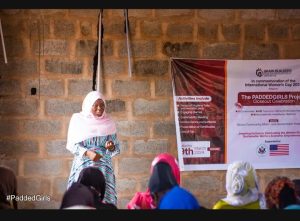
Recent studies have shown a strong link between menstrual challenges and school absenteeism, especially in underserved parts of Nigeria. When girls stay home during their periods due to pain, lack of supplies, or fear of ridicule, they fall behind. Over time, these gaps widen into dropouts, lost opportunities, and stunted potential.
How Poor Menstrual Hygiene Undermines Rights and Development
In Nigeria, menstrual health challenges are robbing young girls of the chance to learn, to grow, and to participate fully in society. Without access to safe and affordable menstrual care, many girls stay home during their periods. Over time, these absences add up, putting them at risk of falling behind, repeating classes, or dropping out entirely. Education, a right guaranteed to every child, becomes conditional on something they can’t control. But the impact doesn’t stop at the school gate.
Using unhygienic materials, often the only option available, can lead to serious health risks. Recurrent infections like urinary tract or reproductive tract infections are common and often go untreated. For some girls, the discomfort becomes normalised. For others, it escalates into long-term health complications.
Then there’s the emotional toll. Growing up in an environment where menstruation is taboo and poorly understood breeds silence, shame, and self-doubt. Girls internalise the message that their bodies are something to be hidden and feared. Studies have linked this stigma to heightened levels of anxiety, isolation, and low self-esteem among adolescent girls.
And all of these, from missed school, poor health, silenced voices, translates into missed opportunities. It deepens gender inequality. It widens the gap between urban and rural communities. It slows progress on nearly every development goal, from education and health to poverty reduction and gender equity.
Our Local Intervention: The Padded Girls Project
When the team from Brain Builders Youth Development Initiative (BBYDI) arrived in Kwara State’s rural communities, they met girls who whispered about menstruation like it was a curse. Some had never seen a proper sanitary pad. Others believed their monthly bleeding made them unclean. In one village, a girl quietly asked if periods were meant to hurt forever.
This was the reality in Moro, Asa, and Ilorin South. These are three Local Government Areas where myths, poverty, and silence have long dictated how girls experience their periods. And it was this reality that gave birth to The Padded Girls Project.
Launched as a grassroots intervention, the project set out with a bold but simple mission to equip girls with the knowledge, tools, and confidence to manage their menstruation with dignity. Over the course of several months, BBYDI worked with over 400 women and girls across eight rural communities. In schools, community halls, and health centres, girls were trained to produce reusable sanitary pads using local materials, transforming what was once a monthly source of anxiety into a potential source of income.
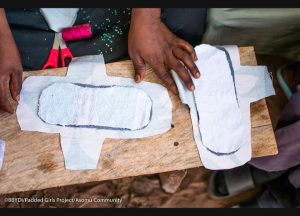
Workshops were held in local dialects — Yoruba and Hausa — making every session inclusive and culturally grounded. Beyond the technical training, participants received education on menstrual hygiene, body literacy, and the harmful myths that have long clouded conversations about periods.
BBYDI Equips Advocates with Tools to Defend Civil Liberties
The impact was immediate and profound.
“Before the project, I thought periods were a punishment,” said Amina from Gaa Alaanu. “Now, I teach other girls how to make pads. I feel proud. I feel useful.”
Others, like Adeola from Olooru, discovered a new source of income.
“Apart from learning how to sew pads, we learned how to sell them. For the first time, I could support my family with something I made myself.”
Zainab from Elemere no longer misses school.
“I used to stay home whenever my period came. But not anymore. The pads I received changed everything.”
To support aspiring entrepreneurs, BBYDI donated 10 hand-sewing machines to girls who showed interest but lacked resources. Today, at least 50 participants have started producing reusable sanitary pads for commercial use.
A Call for Multi-Level Action
The success of the Padded Girls Project is proof of what’s possible when communities are trusted, equipped, and empowered. But one intervention alone cannot solve a crisis that is national in scale and generational in impact. To end period poverty in Nigeria, we need action at every level now.
Government must lead. Menstrual health must be embedded in national health, education, and gender policies as a pillar of inclusive development. This means allocating dedicated budgets for menstrual hygiene products in schools, building girl-friendly sanitation facilities, and integrating comprehensive menstrual health education into the curriculum.
Development actors must go beyond donation. Pads are not enough. We need sustainable, community-rooted solutions that build local capacity and tackle stigma at its source. This includes supporting reusable pad production, training peer educators, and funding long-term, locally led initiatives that understand the nuance of culture and community.
Communities must break the silence. Ending the stigma begins at home. Parents, teachers, and religious leaders all have a role to play in shifting harmful narratives around menstruation. The more we talk, the less girls feel ashamed and the more likely they are to seek help, stay in school, and thrive.
And we must invest together. The challenges are too complex for any single actor to solve alone. It will take coordinated partnerships: governments working with NGOs, civil society collaborating with the private sector, donors funding innovation — not just intervention.
If we care about health, education, gender equality, or economic empowerment, we cannot afford to ignore menstrual hygiene. It is not a ‘soft’ issue. It is a structural one.
Conclusion
On this Menstrual Hygiene Day, let us be clear that no girl should have to choose between her dignity and her education. No woman should feel shame for a natural biological process. And no community should be left behind because we failed to confront silence with truth.
The Padded Girls Project is just one story. One ripple in a much larger sea of change. But it reminds us that progress is possible when we centre the needs of girls, listen to their voices, and give them tools that restore both confidence and control.
I remain personally committed to this cause, not just as a development practitioner, but as a citizen who believes every girl deserves to grow up informed, empowered, and unashamed. But I cannot do this alone. None of us can.
So I invite governments, educators, health professionals, donors, and everyday citizens to stand with us. Join us. Let’s build a Nigeria where menstruation no longer means missed school, lost confidence, or silent suffering.
Because when we empower girls to understand and honour their bodies, we empower them to shape their futures. Let menstrual dignity be the foundation of a fairer, freer world.
By Barr. Nurah Jimoh-Sanni, Executive Director, The Brain Builders Youth Development Initiative (BBYDI)
References
1. Women for Women International. (2024). Period Poverty Doesn’t Stop for Conflicts. Retrieved from https://womenforwomen.org.uk/blog/period-poverty-does-not-stop-for-conflicts (Also cited by World Bank and UNFPA in various reports).
2. Scientific Research Publishing. (2023). Facilities and Misconceptions Concerning Menstrual Health and Menstrual Hygiene Management among Young People in Jos, Plateau State, Nigeria. Retrieved from https://www.scirp.org/journal/paperinformation?paperid=125404
3. Ujaas. (n.d.). Connection Between Menstrual Hygiene and Mental Health. Retrieved from https://www.ujaas.in/blogs/the-connection-between-menstrual-hygiene-and-mental-health
4. ResearchGate. (2025). A Study on Menstrual Hygiene Practices Among Female Students in Private vs. Public Schools in Nigeria. Retrieved from https://www.researchgate.net/publication/390307552_A_Study_on_Menstrual_Hygiene_Practices_Among_Female_Students_in_Private_vs_Public_Schools_in_Nigeria
5. ActionAid UK. (2022). Period poverty: the statistics around the world. Retrieved from https://www.actionaid.org.uk/blog/2022/05/18/period-poverty-statistics-around-world
6. ResearchGate. (2025). An Investigation of the Relationship Between Poor Menstrual Hygiene and School Absenteeism in Nigerian Female Students. Retrieved from https://www.researchgate.net/publication/390355839_An_Investigation_of_the_Relationship_Between_Poor_Menstrual_Hygiene_and_School_Absenteeism_in_Nigerian_Female_Students
7. CDC. (n.d.). Healthy Habits: Menstrual Hygiene. Retrieved from https://www.cdc.gov/hygiene/about/menstrual-hygiene.html
8. ResearchGate. (2025). Exploring the Link Between Menstrual Hygiene and Mental Health in Adolescent Girls in Nigeria. Retrieved from https://www.researchgate.net/publication/390433590_Exploring_the_Link_Between_Menstrual_Hygiene_and_Mental_Health_in_Adolescent_Girls_in_Nigeria
9. United Nations Population Fund (UNFPA). (n.d.). Menstruation and human rights — Frequently asked questions. Retrieved from https://www.unfpa.org/menstruationfaq; World Health Organization (WHO). (2024). Menstrual health is a fundamental human right. Retrieved from https://www.who.int/europe/news/item/15-08-2024-menstrual-health-is-a-fundamental-human-right























